hankyoreh
Links to other country sites 다른 나라 사이트 링크
For trust in the news, South Korea ranks low on international list
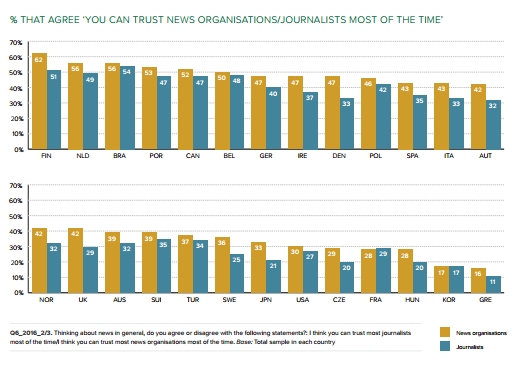
South Korea ranked at the very bottom in an international comparison of trust in news sources. The tendency was particularly noticeable among millennials, people aged 35 and younger.
On June 21, the Korea Press Foundation (KPF) media research center published a report titled “Media Issues,” in which it shared content from the 2016 edition of the annual “Digital News Report” published by the United Kingdom’s Reuters Institute for the Study of Journalism.
The “Media Issues” report was a summary of ten key findings ahead of the publication of a Korean-language version of the “Digital News Report” by the KPF, which this year became a local partner of the Reuters Institute.
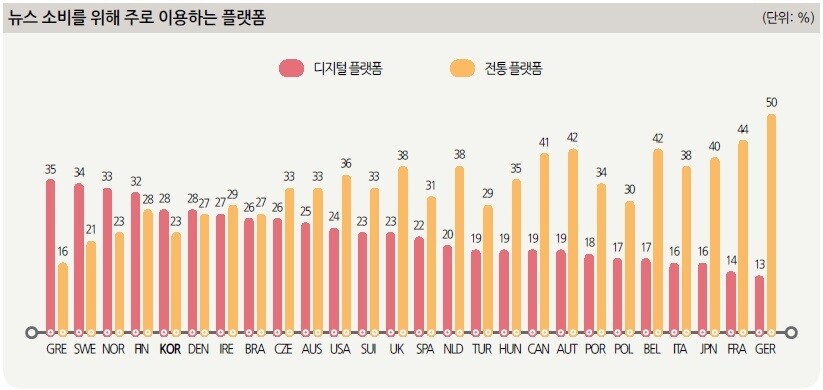
The institute’s 2016 report compared news consumption in 26 countries, including South Korea, the US, the UK, France, Germany, Spain, Italy, Japan, Canada, Australia, and Brazil. The total sample size for the 26 countries amounted to 53,330 people, with 2,147 from South Korea. The KPF plans to publish the full report on June 30.
South Korea was cited as having a particularly high level of online news consumption among the 26 countries examined. Its rate of news consumption primarily through digital platforms was surveyed at 28%, placing it in the top tier after Greece (35%), Sweden (34%), Norway (33%), and Finland (32%).
At 48%, it also showed the highest rate of smartphone use as a primary form of online news consumption. For most countries besides South Korea, Sweden, and Switzerland, the computer was cited as chief device for online news consumption.
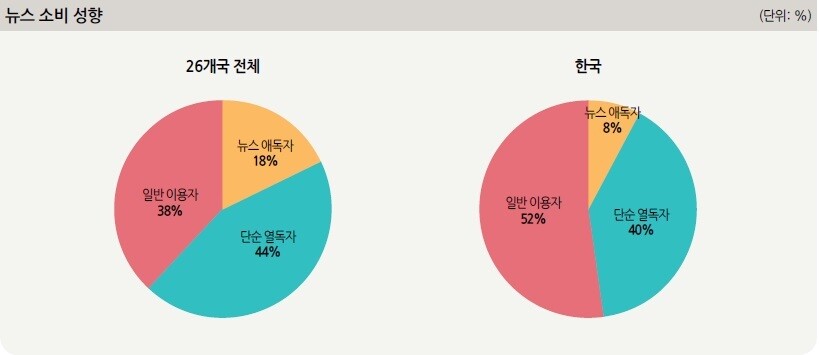
At 28%, South Korea ranked toward the bottom for use of printed media for news access. The highest rates of printed news use were found in Austria (67%) and Switzerland (63%).
Respondents were classified into “news lovers,” who report high levels of interest in news and access it five or more times a day; “daily briefers,” who do not show a high level of interest and access news once a day or never; and “casual users,” who occupy the middle ground. In South Korea‘s case, both news lovers and casual users were found to fall short of the average for all 26 countries. The breakdown among South Korea participants showed 8% news lovers, 40% casual users, and 52% daily briefers, compared to respective averages of 18%, 44%, and 38% for all countries. The percentage of news lovers in particular ranked toward the very bottom alongside Norway (7%) and the Czech Republic (6%). The highest rates of news lovers were found in Turkey (37%), Brazil (29%), Italy (28%), and the US (26%).
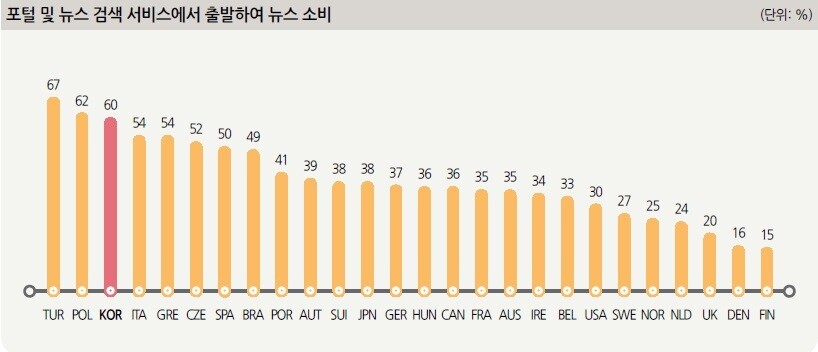
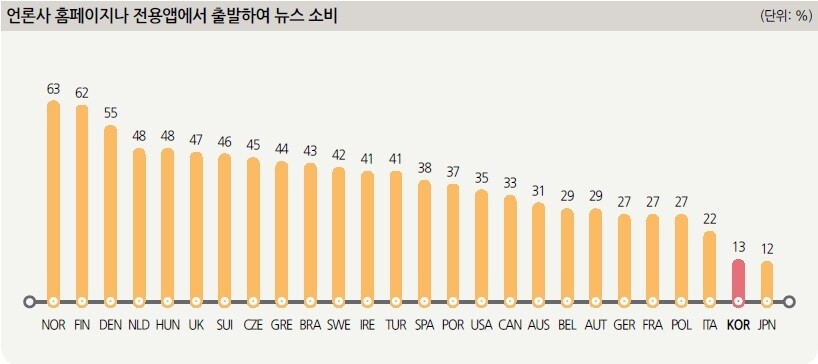
Also notable in the South Korean case were a high level of dependence on portal site and news search services for consumption and a low rate of brand recognition for online news.
At 60%, South Korea’s rate of reporting aggregators (portal services) and search services as a “starting point” for news consumption was the third highest among the 26 countries surveyed. Just 13% said they used news outlet home pages or mobile apps as starting point, ranking it at the very bottom with Japan (12%).
When accessing news through portal sites or social media, rates of 24% and 23% of respondents, respectively, said they always or nearly always noted the news brand.
The results also showed high levels of interest in “soft news” in the areas of lifestyle, sports, entertainment, arts, and culture rather than “hard news” involving international issues, politics, economic issues, health, and education. South Korea ranked alongside Japan as having the lowest level of interest in hard news and highest in soft news.
Countries with high levels of hard news interest included Greece, Spain, Denmark, Germany, and the US.
[%%IMAGE7%%]By Choi Won-hyung, staff reporter
Please direct questions or comments to [english@hani.co.kr]

Editorial・opinion
![[Column] Season 2 of special prosecutor probe may be coming to Korea soon [Column] Season 2 of special prosecutor probe may be coming to Korea soon](https://flexible.img.hani.co.kr/flexible/normal/500/300/imgdb/original/2024/0426/3317141030699447.jpg) [Column] Season 2 of special prosecutor probe may be coming to Korea soon
[Column] Season 2 of special prosecutor probe may be coming to Korea soon![[Column] Park Geun-hye déjà vu in Yoon Suk-yeol [Column] Park Geun-hye déjà vu in Yoon Suk-yeol](https://flexible.img.hani.co.kr/flexible/normal/500/300/imgdb/original/2024/0424/651713945113788.jpg) [Column] Park Geun-hye déjà vu in Yoon Suk-yeol
[Column] Park Geun-hye déjà vu in Yoon Suk-yeol- [Editorial] New weight of N. Korea’s nuclear threats makes dialogue all the more urgent
- [Guest essay] The real reason Korea’s new right wants to dub Rhee a founding father
- [Column] ‘Choson’: Is it time we start referring to N. Korea in its own terms?
- [Editorial] Japan’s rewriting of history with Korea has gone too far
- [Column] The president’s questionable capacity for dialogue
- [Column] Are chaebol firms just pizza pies for families to divvy up as they please?
- [Column] Has Korea, too, crossed the Rubicon on China?
- [Correspondent’s column] In Japan’s alliance with US, echoes of its past alliances with UK
Most viewed articles
- 1Samsung subcontractor worker commits suicide from work stress
- 2Division commander ordered troops to enter raging flood waters before Marine died, survivor says
- 3No good, very bad game for Korea puts it out of Olympics for first time since 1988
- 4‘We must say no’: Seoul defense chief on Korean, USFK involvement in hypothetical Taiwan crisis
- 5[Column] Season 2 of special prosecutor probe may be coming to Korea soon
- 6Is N. Korea threatening to test nukes in response to possible new US-led sanctions body?
- 7Korea’s 1.3% growth in Q1 signals ‘textbook’ return to growth, says government
- 8US overtakes China as Korea’s top export market, prompting trade sanction jitters
- 9[Column] Has Korea, too, crossed the Rubicon on China?
- 10[Column] ‘Choson’: Is it time we start referring to N. Korea in its own terms?